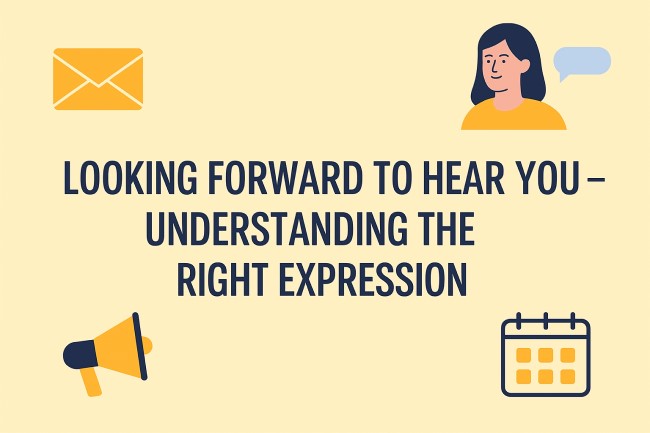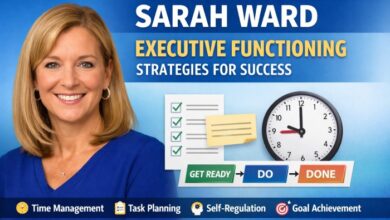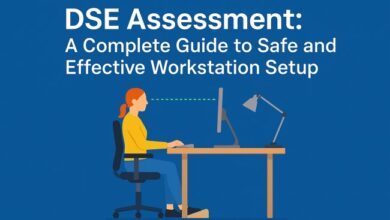Looking Forward to Hear You – Understanding the Right Expression and Its Impact in Communication

In the world of professional communication, the way you end your message matters as much as how you begin it. Whether you are writing an email to a potential client, a cover letter for a job, or a simple business inquiry, your closing line can leave a lasting impression. One of the most commonly used expressions is “looking forward to hear you”, but many people are unaware that it is grammatically incorrect. The correct form should be “looking forward to hearing from you.”
This article explores the meaning, grammar, usage, and emotional impact of this phrase, helping you master the art of effective and polite communication.
Understanding the Phrase “Looking Forward to Hear You”
What Does It Mean?
At first glance, “looking forward to hear you” seems like a polite way of expressing eagerness to receive a response or to speak with someone soon. The intention behind it is perfectly clear — to show enthusiasm or expectation. However, the issue lies in the grammatical construction. The phrase is missing an essential element that changes its correctness in English grammar.
Why It Is Incorrect
The verb phrase “look forward to” ends with the preposition “to.” In English grammar, prepositions must be followed by a noun, pronoun, or gerund (the -ing form of a verb). Therefore, the word following “to” should be “hearing”, not “hear.”
Correct: ✅ I look forward to hearing from you.
Incorrect: ❌ I look forward to hear you.
By using “hear” instead of “hearing,” the sentence violates grammatical rules, making it sound unnatural to native speakers. Although many non-native speakers use it, correcting this small error can make your communication sound more professional and fluent.
The Correct Expression: “Looking Forward to Hearing from You”
Meaning and Usage
“Looking forward to hearing from you” is a polite and professional way to indicate that you are waiting for a response or feedback. It’s commonly used at the end of business emails, cover letters, or formal requests. The phrase shows respect, optimism, and a desire to continue the conversation.
Examples:
-
I’m looking forward to hearing from you soon regarding my application.
-
We look forward to hearing from you about the next steps.
-
I look forward to hearing from you after the meeting.
Each version communicates eagerness without being demanding, which makes it suitable for both formal and semi-formal communication.
When to Use the Phrase
In Professional Emails
The most common place to use this phrase is at the end of an email. It signals that you expect a reply while maintaining politeness. When writing to colleagues, clients, or employers, this closing line builds a tone of engagement and cooperation.
In Job Applications and Cover Letters
Recruiters often receive hundreds of applications daily, and your letter needs to sound both polite and confident. Ending with “I look forward to hearing from you” demonstrates enthusiasm about the opportunity and respect for the hiring process.
In Business Correspondence
When reaching out to customers, partners, or suppliers, using this expression adds a professional tone. It implies that communication is open and that you value the recipient’s response.
Alternative Phrases You Can Use
While “looking forward to hearing from you” is correct and widely accepted, it can sometimes sound repetitive if used too often. Here are some alternative expressions that carry the same meaning but vary slightly in tone:
Formal Alternatives
-
I await your response.
-
I look forward to your feedback.
-
Your prompt reply will be appreciated.
Friendly or Conversational Alternatives
-
Can’t wait to hear your thoughts!
-
Excited to know what you think.
-
Talk soon!
Neutral Alternatives
-
Hope to hear from you soon.
-
Waiting for your kind response.
-
I appreciate your reply in advance.
Choosing the right alternative depends on your relationship with the recipient and the formality of your message.
The Grammar Behind the Phrase
Why “Hearing” Works Better Than “Hear”
The gerund “hearing” functions as a noun in this structure. After the preposition “to,” you always need a noun or noun-equivalent. Therefore, “hearing” fits grammatically, whereas “hear” does not.
Structure Breakdown:
-
Look forward to → verb phrase
-
hearing → gerund (noun form of a verb)
-
from you → prepositional phrase completing the idea
This small distinction is what separates fluent English speakers from learners still mastering professional writing.
Common Mistakes and How to Avoid Them
1. Mixing Tenses
Incorrect: I am looked forward to hearing from you.
Correct: I am looking forward to hearing from you.
Always keep the progressive form when expressing ongoing anticipation.
2. Forgetting “From You”
Incorrect: Looking forward to hearing soon.
Correct: Looking forward to hearing from you soon.
The phrase “from you” identifies whose response is being awaited, making the sentence complete and clear.
3. Using Overly Casual Variants in Formal Emails
Avoid phrases like “Can’t wait to hear from ya!” in business contexts. Maintain professionalism unless you have an established informal relationship.
Why This Phrase Matters in Professional Writing
Building a Positive Impression
The closing line of your email often determines how the recipient perceives your tone. “I look forward to hearing from you” conveys courtesy, patience, and respect — qualities that enhance your professional image.
Encouraging a Response
By expressing that you are looking forward to a reply, you invite communication without sounding pushy. This psychological prompt increases the likelihood of getting a response.
Cultural Universality
In global communication, politeness matters. English speakers from different countries recognize this phrase as a standard, respectful way to close a message, making it a safe choice in international correspondence.
Tips for Using It Effectively
-
Use it once per message to avoid redundancy.
-
Pair it with a clear call to action: e.g., “Please let me know your thoughts by Friday. I look forward to hearing from you.”
-
Adjust your tone: use “I am looking forward to hearing from you” in slightly informal contexts, and “I look forward to hearing from you” in formal situations.
-
Keep your overall message concise and polite — a polite closing works best with a well-structured message.
Conclusion
In communication, every word counts — and so does every closing line. The phrase “looking forward to hear you” may seem polite, but it is grammatically incorrect. The correct and universally accepted form is “looking forward to hearing from you.”
Using the right expression shows mastery of English, professionalism, and respect for your audience. Whether you are writing a business proposal, an email to a colleague, or a job application, the right closing phrase can strengthen your message and leave a lasting positive impression.



